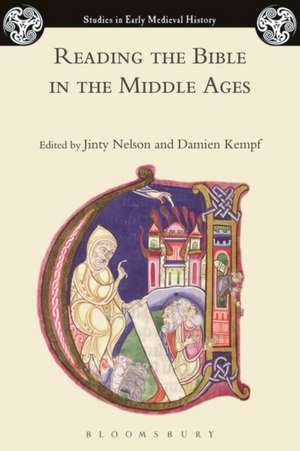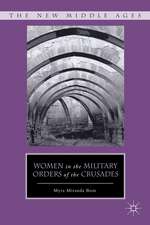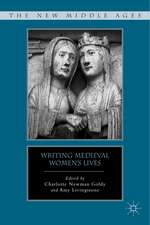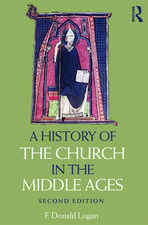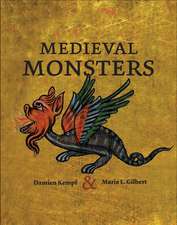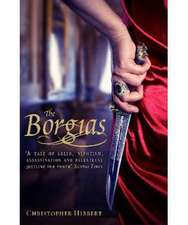Reading the Bible in the Middle Ages: Studies in Early Medieval History
Editat de Jinty Nelson, Damien Kempfen Limba Engleză Paperback – 22 mar 2017
Preț: 258.59 lei
Preț vechi: 295.95 lei
-13% Nou
Puncte Express: 388
Preț estimativ în valută:
49.49€ • 51.35$ • 41.36£
49.49€ • 51.35$ • 41.36£
Carte tipărită la comandă
Livrare economică 17-31 martie
Preluare comenzi: 021 569.72.76
Specificații
ISBN-13: 9781350036284
ISBN-10: 1350036285
Pagini: 296
Dimensiuni: 156 x 234 x 16 mm
Greutate: 0.42 kg
Ediția:NIPPOD
Editura: Bloomsbury Publishing
Colecția Bloomsbury Academic
Seria Studies in Early Medieval History
Locul publicării:London, United Kingdom
ISBN-10: 1350036285
Pagini: 296
Dimensiuni: 156 x 234 x 16 mm
Greutate: 0.42 kg
Ediția:NIPPOD
Editura: Bloomsbury Publishing
Colecția Bloomsbury Academic
Seria Studies in Early Medieval History
Locul publicării:London, United Kingdom
Caracteristici
Demonstrates that for western European Christendom, the period from c. 500 to c. 1250, far from being a Dark Age, was one in which many different people read and heard, interpreted and applied, the lessons they found in the Latin Bible
Notă biografică
Jinty Nelson is Emeritus Professor in the Department of History, King's College London, UK. She is a Fellow of the British Academy and has published extensively on early medieval Europe. Her research focus has been on kingship, government and political ideas, on religion and ritual, and increasingly on women and gender.Damien Kempf is a Senior Lecturer in Medieval History at the University of Liverpool, UK. His research focuses on the political and cultural history of medieval Europe (400-1200). He has recently published a new edition and an English translation of Paul the Deacon's Liber de episcopis Mettensibus (2013).
Cuprins
Introduction, Jinty Nelson (Kings College London, UK) and Damien Kempf (University of Liverpool, UK)1. Twelfth-century Notions of the Canon of the Bible, Cornelia Linde (German Historical Institute, UK)2. The Orator as Exegete: Cassiodorus as a Reader of the Psalms, Gerda Heydemann (Österreichische Akademie der Wissenschaften, Austria))3. Lay Readers of the Bible in the Carolingian Ninth Century, Jinty Nelson (King's College London, UK)4. Jeremiah, Job, Terence and Paschasius Radbertus: Political Rhetoric and Biblical Authority in the Epitaphium Arsenii, Mayke de Jong (University of Utrecht, The Netherlands)5. Biblical Readings for the Night Office in Eleventh-century Germany: Reconciling Theory and Practice, Henry Parkes (Gonville and Caius College, University of Cambridge, UK)6. 'Quid nobis cum allegoria?' The Literal Reading of the Bible in the Era of the Investiture Contest, Florian Hartmann (University of Bonn, Germany)7. Sibyls, Tanners and Leper Kings: Taking Notes from the Bible in Twelfth-century England, Julie Barrau (Emmanuel College, University of Cambridge, UK)7. Violence, Control, Prophecy and Power in Twelfth-century France and Germany, Claire Weeda (University of Amsterdam, The Netherlands)Further ReadingIndex
Recenzii
This is an excellent collection of essays demonstrating a wide variety of ways in which medieval people experienced and used Scripture. Particularly welcome is the consideration of audience and of the embedding of exegetical argumentation in wider political and personal aims.
Unusually coherent and crisply written, displaying an impressive chronological and geographic range, this volume tell us who read the Bible, why, to what uses readers put it, and what versions they read. These essays will be of keen interest to scholars in many fields.
[This] collection will offer medievalists of every stripe much food for thought and fodder for further research.
Unusually coherent and crisply written, displaying an impressive chronological and geographic range, this volume tell us who read the Bible, why, to what uses readers put it, and what versions they read. These essays will be of keen interest to scholars in many fields.
[This] collection will offer medievalists of every stripe much food for thought and fodder for further research.
